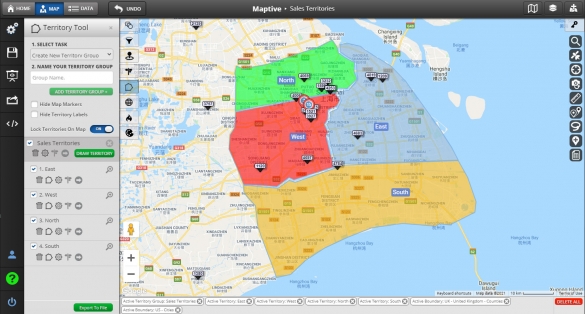
What’s the secret to higher producing—and more productive—sales teams? Data.
With leads popping up by the moment, sales figures expanding and contracting across multiple territories, and quotas to be made, sales aren’t just one of the important aspects of your business; it’s also its most dynamic.
Data gives your sales team the proper direction it needs to predictably and consistently boost sales. And if you don’t use data? Your sales team is left rudderless and confused, making your territories vulnerable for your competition’s taking.
With high stakes, your business must make the most informed, efficient, and high-yield decisions possible. High-quality, detailed data allows you to do so.
For example, data discovered this: territory design optimization is one of the simplest-to-implement, yet most effective, steps you can take to generate dramatically more revenue.
Harvard Business Review found that you can increase sales by up to 7% by optimizing your territory design, with, according to Alexander Group, a 10-20% increase in sales productivity.
Research from Xactly found a 30% higher sales performance in companies that optimize their sales territory design.
The results are clear: to increase your revenue and outpace your competition, you must have detailed data, well-optimized territories, and the ability to plan winning sales strategies and execute them efficiently.
Enter sales mapping software.
Table of Contents
Top-performing organizations trust sales mapping software to make more informed and more profitable sales decisions. Sales mapping software integrates your company’s sales data with geolocation, transforming massive spreadsheets, unwieldy data sets, and complicated CRMs into easy-to-read territory data visualizations.
While each software on the market provides the same core utility, the best sales mapping software helps your company grow by giving your sales access to performance-enhancing insights.
The best sales mapping software allows you to:
The benefits are bountiful. For example, sales managers receive the exact information they need to run their territories better, support their reps, and discover competitive advantages.
Sales reps get a repeatable system to generate leads, deepen their relationships, and increase their commissions.
And your organization gains a potent asset for increasing revenue, productivity, and profitability.
Not all sales mapping software is created equal.
Even though plenty of solutions offer your basic need—your sales data visualized on maps, many lack some or all of the features that mark the difference between a nice-to-have tool and a must-have asset.
The best sales mapping software understands its key purpose: to make it easy for you to generate as much revenue as possible, as easily as possible, in every single one of your territories.
When deciding on your sales mapping software, look out for these features:
However, you also need the ability to draw custom boundaries based on your established territories and account for any on-the-fly pivots you need to make.
The best software mapping software also allows you to include Census-based demographic data, such as age, education, income, transportation, labor, gender, and more. This will help your sales team understand their customers better and improve your ad targeting’s efficacy.
Route planning tools will help your team save a lot of time by calculating the shortest-possible routes, projecting travel time and distance between locations, and creating and saving your sales routes. Look for a route optimization tool that allows you to easily change your route order, plot multiple routes to account for different scenarios, and plot unlimited stops.
Exploring your options? These solutions are widely considered to be the best sales mapping software on the market today. Learn more about each solution and whether they’re the right fit for your business below.
Sales teams value Maptive for its rich feature set, including its built-in route optimization, ability to add and share customer insights and leads, and its robust filtration tool—particularly the “average sale” filter, which enables sales teams to target high-value leads.
Maptive allows you to create efficient sales routes with unlimited stops almost instantly. Simply and securely upload your location-based data on their 256-bit SSL-encrypted software and receive a fully customizable and easy-to-navigate map.
With a full feature set focused on intuitive route and territory design optimization, deep customization, and complete territory insights—including heat maps and demographics, Maptive is the best overall sales mapping software.
Interested in trying Maptive? Maptive offers a free, no-risk, 10-day trial—no credit card required, so you can start mapping now.
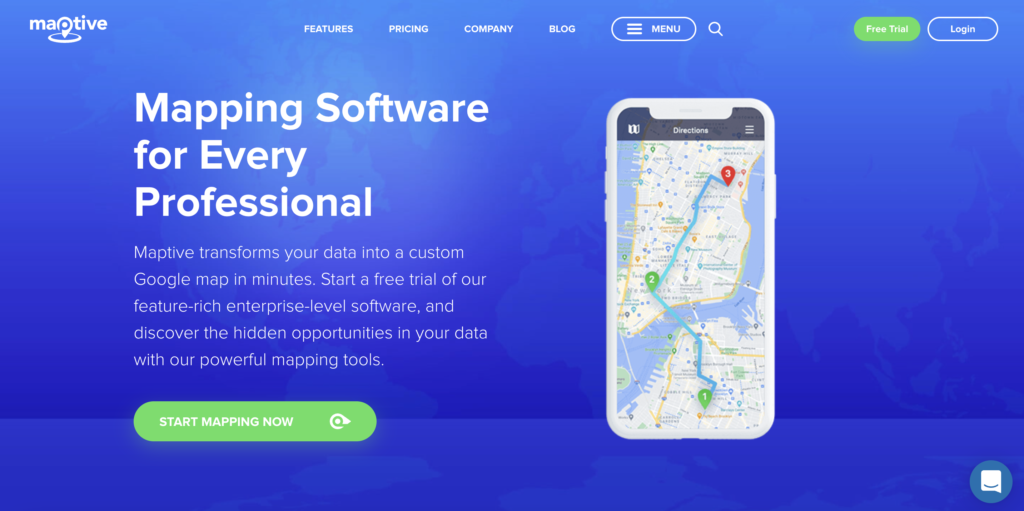
Badger Maps is one of the popular sales mapping software options for a good reason: their mobile-first approach. Designed for sales reps on the go, Badger Maps gives reps a full-featured app, including a live territory map with up-to-the-moment traffic updates, simplified admin tasks, and an automated check-in feature to keep managers in the know.
While Badger Maps does a very good job at route optimization, its features are unbalanced. Some users report that it’s overly complicated and difficult to adopt, and others left wanting more. And while it’s great for sales reps in the field, it ignores several key features: including comprehensive data-driven sales insights, big-picture outlook, customization, and much more.
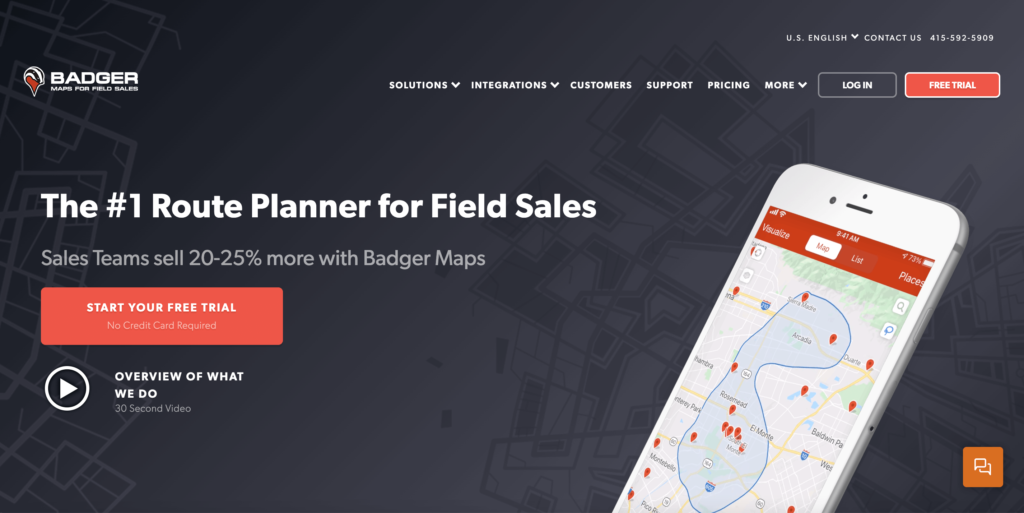
Spotio is a micromanager’s dream: it automatically tracks each sale’s reps’ stops (including date, time, and GPS coordinates), lets managers schedule their rep’s day with a built-in calendar, and updates maps when a rep closes a deal. If you want your sales managers to track their rep’s every move, then Spotio is the right solution for you.
However, this micro-view is also its biggest drawback. For one, its precise and persistent tracking favors sales managers with a turn-and-burn philosophy versus a team-first, growth, and retention approach. And users report Spotio’s difficulty in managing macro-level data, with maps becoming less detailed (and, therefore, less valuable) the more you pan out.
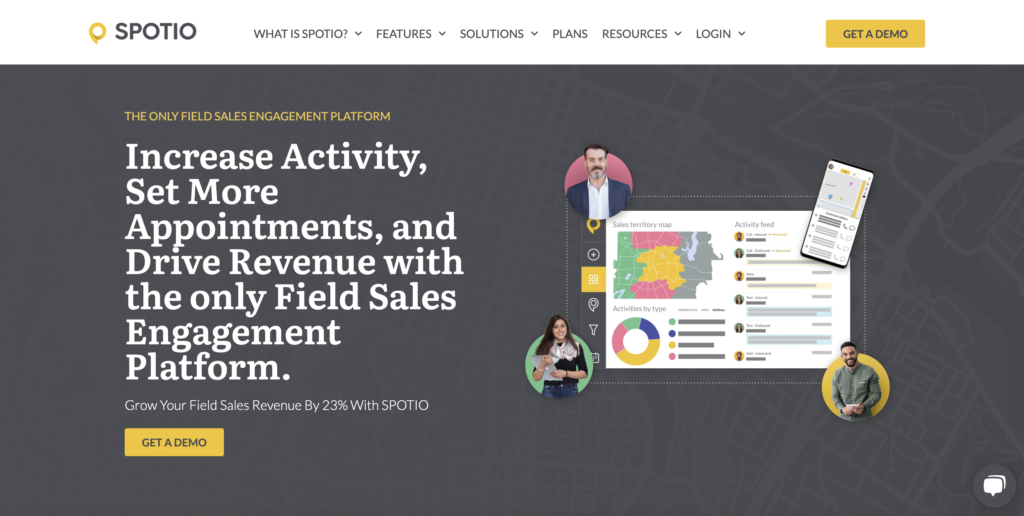
Looking for no-frills sales mapping software? Mapline is a simple entry point for organizations that want to try mapping software without any advanced features. And since it’s one-size-fits-all by design, you can use it for non-sales applications. Mapline is built to work with Microsoft Excel, so it’s an easy in-way for organizations using the Microsoft Office Suite.
If you want to extract key insights, however, you have to export the data yourself and ad hoc a solution of your own. Its design sacrifices functionality for adoption: making it easy for you to implement but difficult for you to get the basic results other sales mapping software provides.
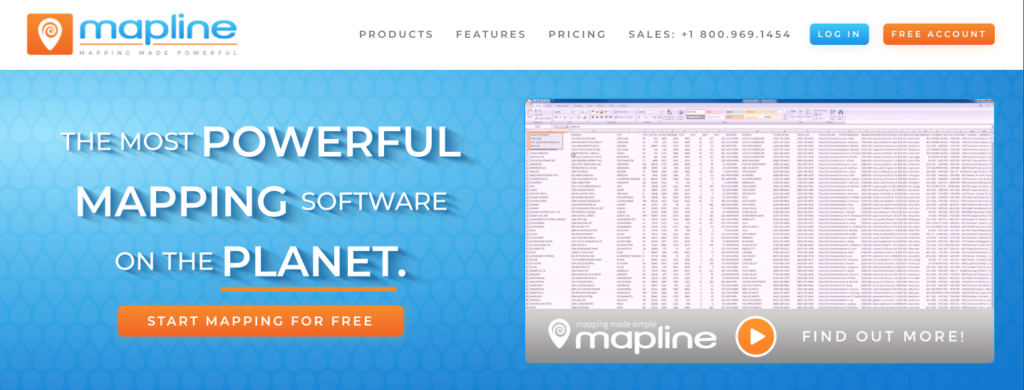
eSpatial offers many of the exact things you want in your sales mapping software: deep customization, rich data sets (including Census demographic data), territory optimization, and Google Maps integration. In many ways, eSpatial is comparable in features to Maptive.
The two solutions differ: while Maptive integrates with virtually every spreadsheet and CRM Software, eSpatial only integrates with Salesforce. So, not only is it expensive on its own—$1,295 per year for a single user, and $2,995 for teams (with up to five users), even considering the required Salesforce-eSpatial stack comes with a hefty cost.
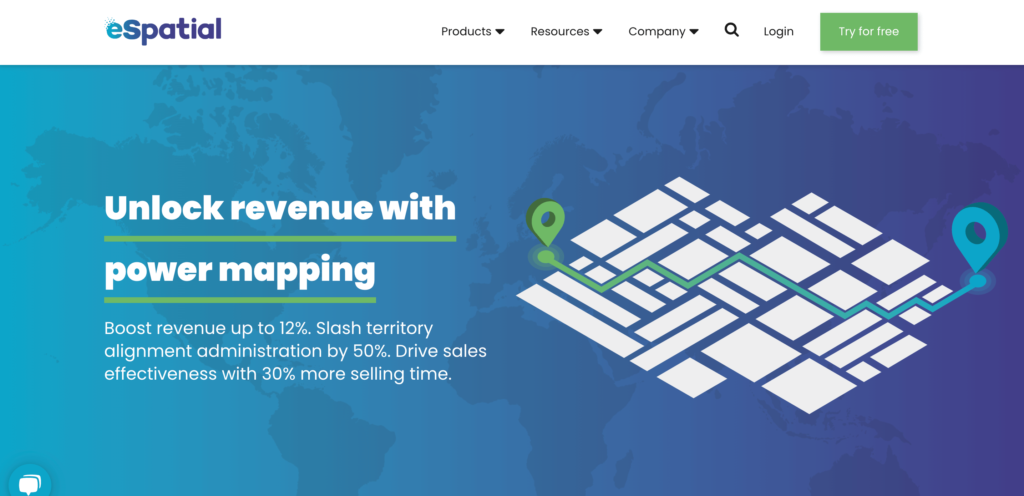
Google Maps is great. With its ease of use, free access, Street View, and robust API, Google Maps handily earns the award of “lowest-barrier-of-entry route planner.” No wonder sales mapping software solutions like Maptive and eSpatial build their services on Google Maps.
But keep this in mind: without the features included in a more comprehensive service, Google Maps is best for simple routes, bootstrapping companies, and teams that aren’t yet at the stage where customization will give them a competitive edge. For example, Google Maps only allows you to route ten stops (25 if you use a workaround) and doesn’t offer much in the way of route optimization on its own.
If you’ve tried Google Maps and found yourself wanting more, consider Maptive. Maptive offers all of the advanced options that Google Maps lacks but with a similarly user-friendly experience.
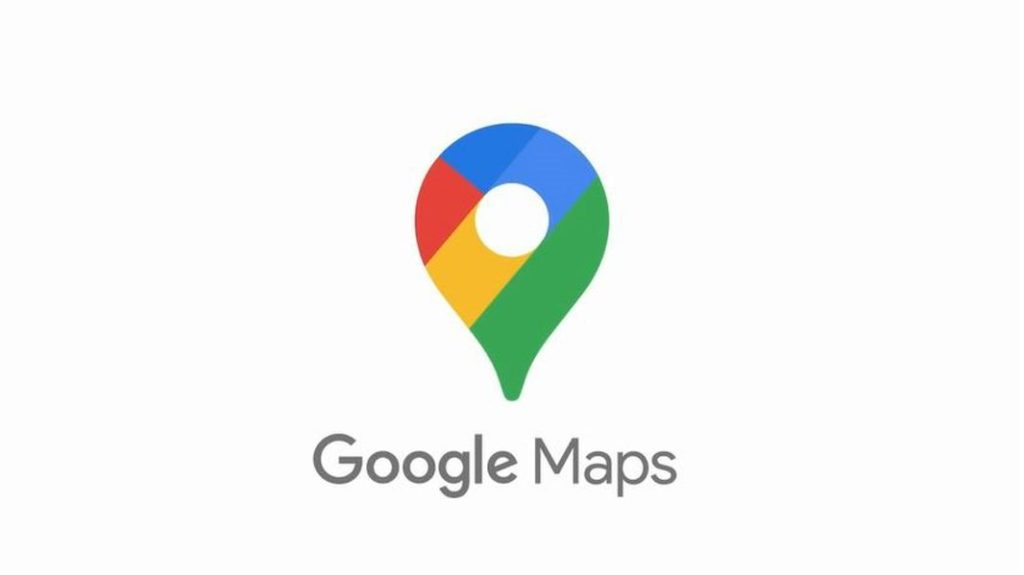
Like eSpatial, Geopointe is a designed-for-Salesforce application for sales data mapping. Available in Salesforce AppExchange, Geopointe location enables the Salesforce CRM, allowing you to analyze, manipulate, and visualize your customer accounts.
Already using Salesforce? Then Geopointe may work well for you as it’s less cost-prohibitive and more flexible than eSpatial. Prices start at $55 per user, and any features you want, outside of visualizing basic sales data, are available as add-on upsells. While Geopointe is not the right choice for most sales teams, it’s perfect for organizations that use Salesforce, are price-conscious, and prefer to pick their features instead of getting everything out of the box.
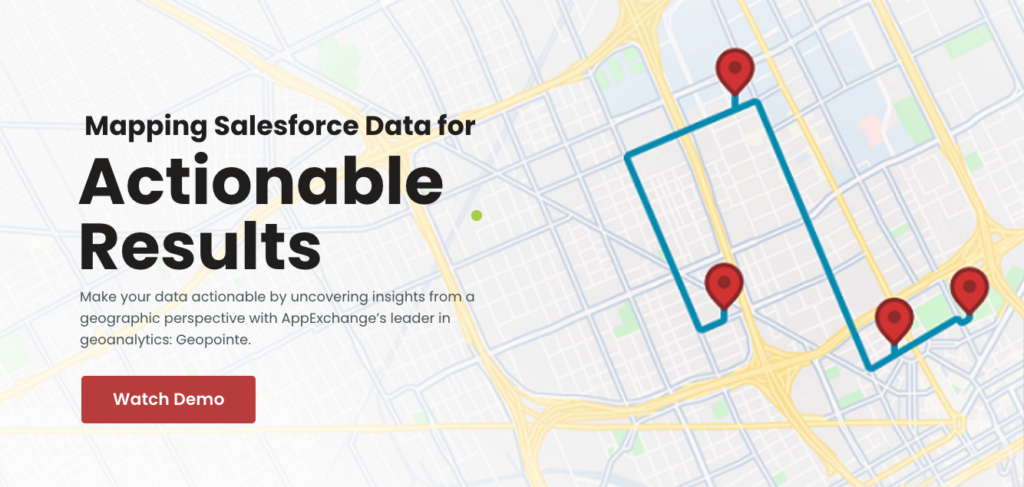
Sales mapping software is a must-have if you want your sales team to thrive in the modern market. Integrating your customer data with detailed maps, these solutions give you the precise information you need to create sharply optimized territories, spot high-potential opportunities, and elevate your revenue generation far above your expectations—and competition.
Every business has unique needs, and some sales mapping software will pose a better fit for you than others. Regardless of your decision, rest assured that making a choice to implement sales mapping software will lead to better results.
Because it offers the full range of key features and ease-of-use, flexibility, and customization, Maptive is the best sales mapping software available.
Maptive gives your organization great tools to systematically increase your sales, including the ability to:
Sign up for a free trial of Maptive today and discover how our mapping software can help you boost your sales and run your business more efficiently, productively, and profitably.
Brad Crisp is the CEO at Maptive.com, based in Denver, CO and born in San Francisco, CA. He has extensive experience in Business Mapping, GIS, Data Visualization, Mapping Data Analytics and all forms of software development. His career includes Software Development and Venture Capital dating back to 1998 at businesses like Maptive, GlobalMojo (now Giving Assistant), KPG Ventures, Loopnet, NextCard, and Banking.
